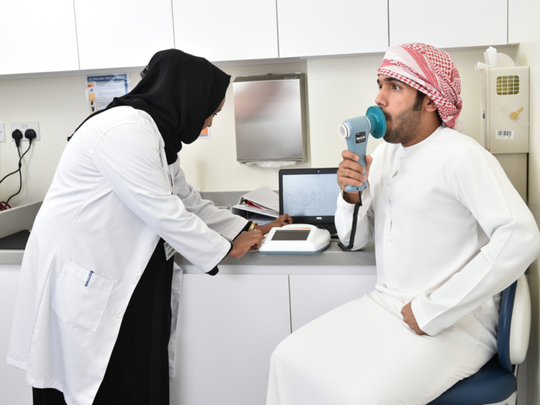
Abu Dhabi: A long-term project launched on Sunday by the New York University Abu Dhabi will study high prevalence of lifestyle diseases like obesity and diabetes among Emiratis.
The study will follow 20,000 Emiratis between the ages of 18 and 40 years in a bid to determine the role genetics play in the development of obesity and diabetes in the region, and the contribution of other environmental and lifestyle factors to the prevalence of these diseases.
Researchers said all study participants would be recruited by the end of 2018. They will then be followed up in 2023, and once again in 2028.
“We are seeing a rising tide of non-communicable diseases in the region, notably over the last decade. Yet there have been no longitudinal studies to see the interplay of the various risk factors among Emiratis,” said Dr Raghib Ali, director of the Public Health Research Centre at the University.
“This study will recruit Emiratis, most of whom are expected to be healthy and non-diabetic at the start of the study. We will then trace how participants go on to develop diabetes or heart disease during the course of their lives, and what risk factors were involved,” he added.
As reported by Gulf News last week, the UAE is known to have one of the highest rates of diabetes prevalence in the world, with about 19 per cent of the adult population between the ages of 20 and 79 years affected. This translates into one million confirmed diabetics, and about 450,000 more who are as yet undiagnosed. In Abu Dhabi emirate, about 18 per cent of adult Emiratis are known to be diabetic.
“Diabetes is a major risk factor for cardiovascular disease, which is the top cause of death in the country. In fact, between 2005 and 2015, the number of deaths by heart disease alone increased by 61.2 per cent. Such a study is therefore necessary in order to learn how to better protect future generations,” Dr Ali said.
The professor added that in addition to lifestyle habits, certain environmental factors could have had a profound impact on Emiratis’ predisposition to develop diabetes, including the environment the growing foetus is exposed to in the womb. A study in Europe has shown, for example, that children born during periods of food scarcity were less able to handle the greater amount of calories they consumed later on in life, and were more predisposed to developing diabetes, he said.
“We know that in the UAE, people often faced food scarcity in the past, and I believe this is one of the main reasons why Emiratis born from the 1940s until the 1970s may have a much higher risk of developing diabetes,” Dr Ali explained.
As part of the study, interested participants will provide biological samples, and these will be tested and the results recorded while ensuring confidentiality. The subjects will then be contacted at regular intervals to check the status of their health.













